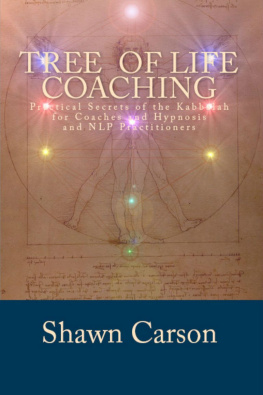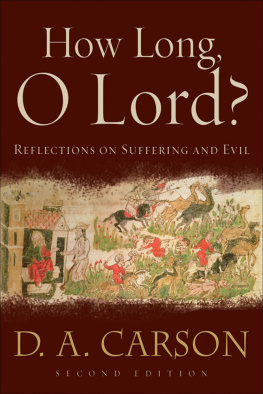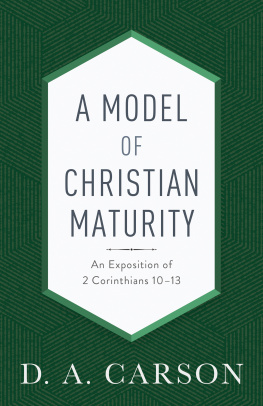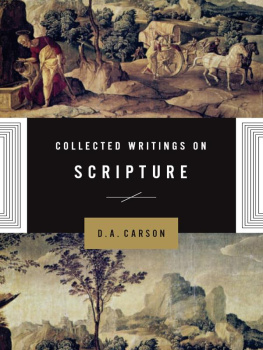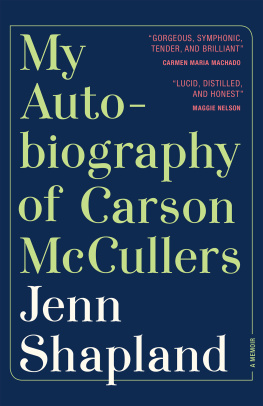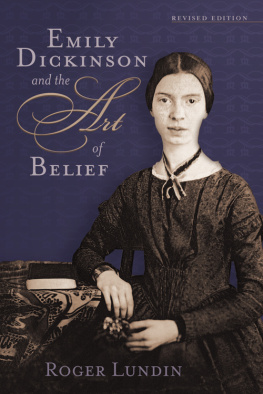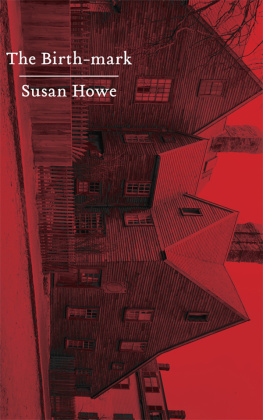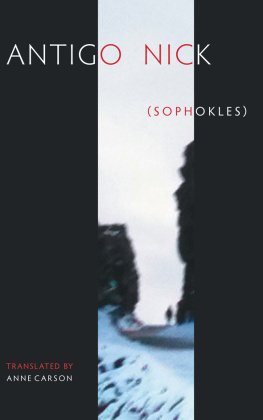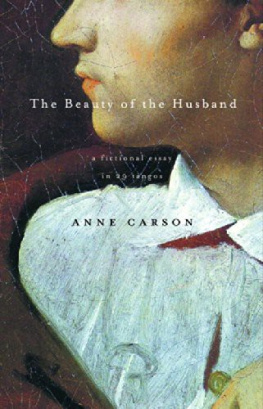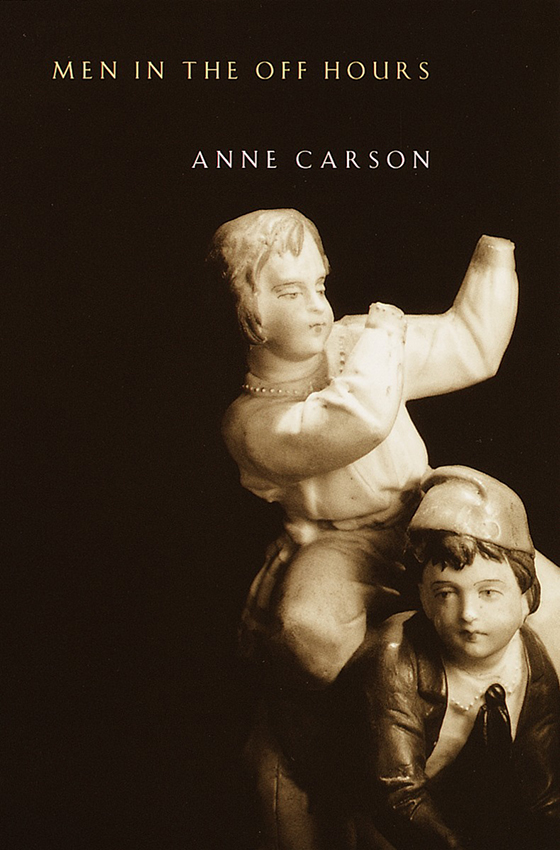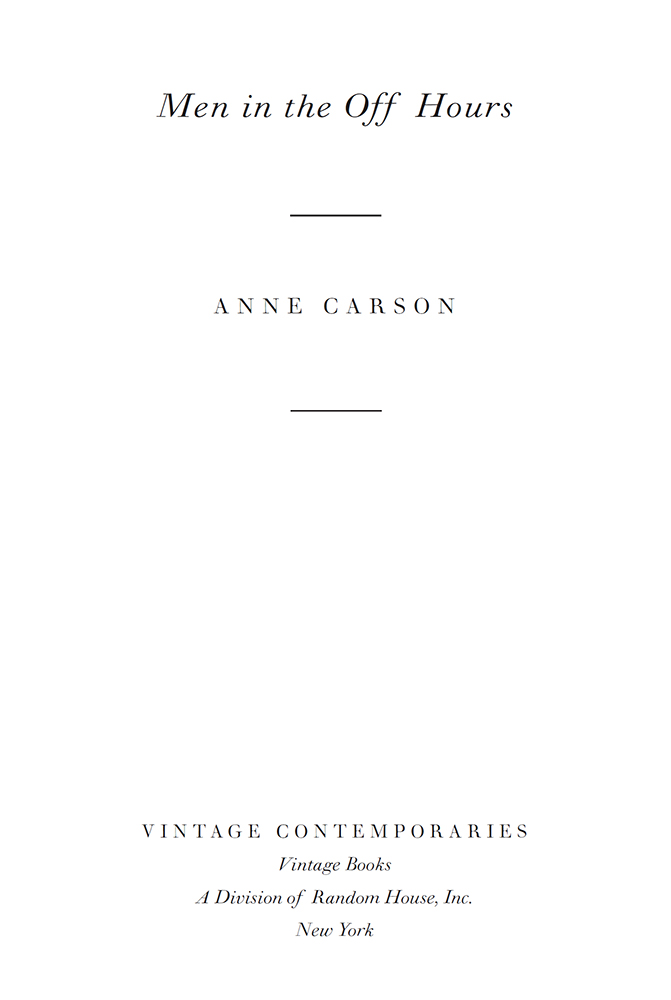FIRST VINTAGE CONTEMPORARIES EDITION, FEBRUARY 2001
Copyright 2000 by Anne Carson All rights reserved under International and Pan-American Copyright Conventions. Published in the United States by Vintage Books, a division of Random House LLC, New York, and in Canada by Random House of Canada Limited, Toronto, Penguin Random House companies. Originally published in hardcover in the United States by Alfred A. Knopf, a division of Random House, Inc., New York, in 2000. Vintage is a registered trademark and Vintage Contemporaries and colophon are trademarks of Random House, Inc. Some of the poems in this collection were originally published in the following:
American Poetry Review: Catullus:
Carmina;
Chicago Review: Shadowboxer;
Conjunctions: TV Men: Artaud;
Fence: Ordinary Time: Virginia Woolf and Thucydides on War and Appendix to Ordinary Time;
The New Yorker: New Rule and Fathers Old Blue Cardigan;
Paris Review: Flatman and TV Men: Antigone;
Parnassus: TV Men: Lazarus;
PN Review: TV Men: Akhmatova;
Raritan: Essay on What I Think About Most, Hopper:
Confessions and TV Men: Tolstoy;
Seneca Review: Irony Is Not Enough: Essay on My Life as Catherine Deneuve;
The Threepenny Review: Epitaph: Oedipus Nap and TV Men: Thucydides in Conversation with Virginia Woolf on the Set of
The Peloponnesian War;
Princeton University Press, Before Sexuality (1990), edited by F.
Zeitlin and D. Halperin: Dirt and Desire: Essay on the Phenomenology of Female Pollution in Antiquity. This book is a work of fiction. The reference to Catherine Deneuve that appears in My Life as Catherine Deneuve is an allusion to a character in the film Les Voleurs. All other characters and all actions, events, motivations, thoughts and conversations portrayed in this work are entirely the product of the authors imagination, and any resemblance to actual persons or events is entirely coincidental. cm.
ISBN 0-375-70756-5 (pbk.)
I. cm.
ISBN 0-375-70756-5 (pbk.)
I.
Title.
PS3553.A7667 M46 2001
811.54dc21 00-063389 eBook ISBN: 978-0-307-55787-2 Book design by Dorothy Schmiderer Baker www.vintagebooks.com Cover design by Carol Devine Carson
Photograph J. John Priola v3.1 CONTENTS
Note to Readers of the eBook Edition
This book contains long lines of poetry. The line below is the longest in the book. some jokes and games, to drink and chat and go hunting in the mountains. If this line is breaking on your e-reader, you may choose to decrease the font-size setting until the entire line fits on your screen. This may not be possible on all e-reading devices.
ORDINARY TIME: VIRGINIA WOOLF AND THUCYDIDES ON WAR I like the way Thucydides begins his account of the hostilities between Athenians and Peloponnesians that we call the Peloponnesian War. The account begins Book 2 of his History. For he has spent Book I telling what happened before the beginning, which he calls archaeology. His archaeology reads like a swirling dust of anecdotes and speech and usual pretexts and true causes. His beginning, on the other hand, is sharp. (2.2.1) Thucydides fixes the commencement of the war according to the forms of reckoning customary in the three most important Hellenic states; we learn how they tell time in Argos and Sparta and Athens. (2.2.1) Thucydides fixes the commencement of the war according to the forms of reckoning customary in the three most important Hellenic states; we learn how they tell time in Argos and Sparta and Athens.
How people tell time is an intimate and local fact about them. Thucydides sets us on a high vantage point above such facts, so that we look down as if at a map of the Greek states and see lives churning forward thereeach in its own time zone, its own system of measures, its own local names. Soon this manifold will fuse into one time and system, under the name of war. But first we see it as hard separate facts. Then we see separateness caught in a larger necessity. For the local time zones of Argos, Sparta and Athens are framed by reference to the capture of Euboea and the battle of Potidaea, two historical events detailed by Thucydides himself in Book I of his History.
A historians account will necessarily encompass local ways of telling time. Still, even this is not final. Historiographical time is itself bound by the habits of nature. Thucydides decided military history should be dated as to campaigning seasons. The events of the war have been recorded in the order of their occurrence, summer by summer and winter by winter, he says at the beginning of Book II (2.1.1). Naturally he locates the affair of the Thebans who entered Plataea, which triggered the war and so came just before the first summer, at the opening of spring (2.1.2).
And perhaps because he himself did not sleep wellfor he wrote his History from exile, having been banished in 424 B.C. for failing to prevent the reduction of Amphipolis, and may have stayed awake for twenty years somewhere in Thrace or the Peloponnese, following the war with close attention by day and writing up his notes at nighthe marks the start of that long interval: about the first watch of the night. Virginia Woolf wrote The Mark on the Wall at the start of the First World War. She too begins with chronology. But she does not, like Thucydides, rise above ordinary time to a high point and look down on other people, other peoples reckonings. She stays in her own time.
She stays right in the middle. It was in the middle of January in the present year when I But how do you know what is the middle? As time it is vague. Its borders reach to the edges of what one saw from where one sat. What one saw was fire, yellow light on pages, chrysanthemums in a round glass bowl, cigarette smoke, burning coals, an old fancy of crimson flags and red knights riding up the black rock. What one saw was the middle of time. One saw nothing happening there, for nothing ever happens there.
Until it does. To my relief the sight of the mark interrupted. For Virginia Woolf, as for Thucydides, it is important to mark the beginning of war. Otherwise, and so easily, it will lose itself into the middle of time always the most mysterious of losses. No photographs of ruined houses or dead bodies are yet in evidence in 1914. And Thucydides tells us the Thebans entered Plataea because they foresaw war coming and wished to get Plataea while there was still peace, war being not yet obvious (2.2.3).
Indeed, little was obvious that night. The Thebans slipped into Plataea unobserved, by intrigue of some partisans within the town, then at once lost track of their own strategy. Their plan had been clear: to attack immediately. Instead they grounded their arms in the marketplace, sat down, and proclaimed a negotiation. Why? It was the beginning of their death. Thucydides offers no explanationwhat an accidental affair this living is after all our civilization, says Virginia Woolf.
Meanwhile the Plataeans were dismantling their civilization from the insidedigging through the party walls between their houses in order to gather and sally forth in strength against the Thebans. They waited for the blackness before dawn. They attacked. With ones hair flying back like the tail of a race horse, says Virginia Woolf of the rapidity of life. Death too is rapidin panic streets on a moonless night (for these things took place at the end of the month, Thucydides notes [2.4.2]) and it was raining, not just rain but stones and ceramic tiles from women and slaves who stood on the roofs and pelted the Thebans, screaming. They died because in the black substance of someone elses night all the streets looked the same all so casual, all so haphazard.



